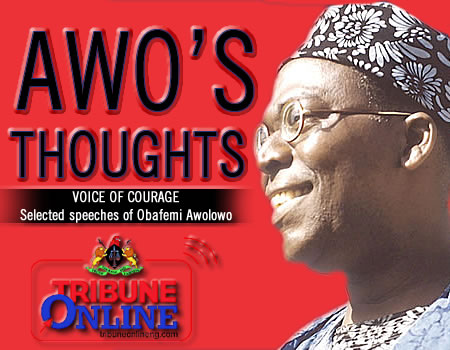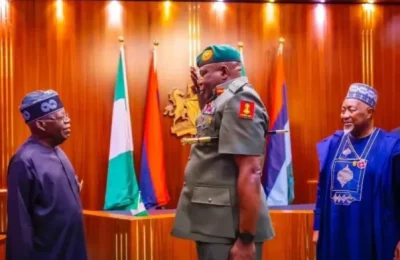Speech given in the Western House of Assembly, Ibadan, on 16 July, 1952.
The cardinal principle,’ says he, ‘upon which the Administration of Northern Nigeria was based was what has been commonly called “Indirect Rule”, namely rule through native chiefs who are regarded as an integral part of the machinery of government.
‘The de facto rulers who after the British conquest of Northern Nigeria had been reinstated or appointed to the various Emirates, and all other de facto chiefs who have been recognized as government agents, were to be supported and their authority upheld…

‘The native chiefs, thus recognized, were not to be regarded as independent rulers. They were the delegates of the Governor whose representative was the Resdient…’
There are three outstanding features of Lord Lugard’s statement of the principle of indirect rule to which I wish to call the attention of this Hon. House.
The first is British rule.
The second is that the British government ruled through native chiefs.

And the third is that these chiefs were not to be regarded as independent. They were the delegates of the Governor or of the Resident who was the representative of the Governor.
As time went on, due partly to an evolution of liberalism in British Colonial policy and partly to consistent agitation on the part of the politicians of the day, Lord Lugard’s principle of Indirect Rule underwent some modification. In his restatement of the principle Sir Donald Cameron regarded the tribal institutions which the people have evolved for themselves as the ‘agency through which the British Government ruled the people’. The essence of Sir Donald’s restatement is that the ‘tribal institutions’ which we have evolved should be ‘adapted for purpose’ of Local Government so that we may develop in a constitutional manner from our own past guided and restrained by the traditions and sanctions which we have inherited, moulded or modified as they may be with the advice of the British officers and by the general control of those officers.’
It is the principle of Indirect Rule, as rested by Sir Donald Cameron, that is being applied to. ‘ay throughout the Western Region. It is therefore important that I should draw the’ attention of this House to the four significant features of Sir Donald Cameron’s re-statement. The first again in British rule.
The second, rather different from that of Lord Lugard, is that the British Government ruled through the agency not of chiefs, not of Native Authorities this time, but through the agency of tribal institutions which we have evolved for ourselves.
The third is, that these tribal institutions are to be moulded or modified as time goes on.
The fourth is that such moulding and modification should be done, and this requires emphasis, only on the advice of British officers and by the general control of such officers.
I have enumerated these four significant features in order to enable Hon. Members to make their comparison and contrast between the principle of Indirect Rule, as pronounced by either Lord Lugard or Sir Donald Cameron, and that which underlies the present proposed reform. For if we remove the first and fourth features, namely, British rule, and that any modifications should be under the advice of British officers and by the general control of such officers, and replace them with two other features of our own which are in keeping with the present political advance in the country, we will arrive at once at the five features of the present reform.
The first feature is that we are to rule ourselves under the guidance, not control, mark these words, of the British Government.
The second is that we are to rule ourselves at the local government level through the agency of traditional institutions – which we have evolved for ourselves, the case may be from time to time.
The third is that these traditional institutions are to be moulded or modified as the case may he from time to time. The forth is that every moulding or modification shall be made, not now by the general control of British officers, but only in accordance with the popular will of the people. The fifth is that the chiefs are to become, at the local government level, independent rulers. Henceforth they will be the delegates of their own people.
From this enumeration, it will be seen that the underlying principle of the present reform is more in keeping with human dignity and the inalienable rights of man than the principle of Indirect Rule that I have previously referred to. It seeks to give us self-rule at the local government level and to prepare us for a yet greater objective which is self-government for the whole of Nigeria. The provisions of this Bill are nothing but the comprehensive mechanics by which this principle may beeffectively applied throughout the Region. It will be wrong, however, to imagine that the provision of this Bill will necessitate any revolutionary changes to which many of our people will find it difficult to accommodate themselves. On the contrary many of the changes to which this Bill now seeks to give statutory effect are changes which have grown up as conventions and practices under the existing Native Authority Ordinance.
I will give a few instances to illustrate my contention. The Bill provides for the election of elected members to the various councils. The Native Authority Ordinance makes no provision for elected members. All members are deemed to be appointed by the Lieutenant-Governor but in actual practice, in a large number of places, elections do take place and what the Lieutenant-Governor invariably does is to appoint those persons whom the people have by popular vote elected for themselves.
Again, this Bill provides for the ratio of traditional members to elected members to be not more than 1:3. In reality, in about 80 per cent of the Native Authorities, superior and subordinate, throughout the Region, this ratio is either already attained or is much less than that proposed in this Bill. The Native Authorities which have not yet reached this ratio are those in the Oshun Division in Ibadan Province, those in Oyo Province and a minority of those in Ondo Province. In the other five Provinces (Colony, Benin, Warri, Ijebu and Abeokuta), Native Authorities with more than this ratio are practically non-existent.
CONTINUES NEXT WEEK
YOU SHOULD NOT MISS THESE HEADLINES FROM NIGERIAN TRIBUNE
2023 Ballon d’Or: Osimhen finishes eight, becomes highest ranked Nigerian footballer
Super Eagles and Napoli forward, Victor Osimhen, has achieved the highest ranking for a Nigerian in the history of the Ballon d’Or football award. Osimhen achieved this milestone by ranking eighth in the 30-man list of the 2023 Ballon d’Or award...….
Tinubu intervenes in Fubara, Wike rift
President Bola Tinubu has moved to end the rift between Governor Simi Fubara of Rivers State and his predecessor in office, Nyesom Wike, which has dragged the state into a political crisis.The president used the opportunity of Tuesday’s meeting of the Police Council, which both attended as members, to ostensibly end the feud between the two political allies……..
Reps summon Betta Edu over N1.1trn Conditional Cash Transfer
The House of Representatives on Tuesday summoned the Minister of Humanitarian Affairs and Poverty Alleviation, Betta Edu, over the implementation of the N1.1 trillion Conditional Cash Transfer (CCT) for vulnerable Nigerians.The resolution which was passed sequel to the adoption of a motion under ‘Matters of urgent public importance’ sponsored by Hon. Moshood Adebayo (PDP-Osun), who harped on the need to scrutinize the policy on the CCT....….…
2024 Olympic Qualifiers: Super Falcons thrash Ethiopia, zoom to next round
Nigeria’s Super Falcons have booked a place in the third round of the qualifiers for the 2024 Olympic Games after a 4-0 win against Ethiopia at the Moshood Abiola Stadium, Abuja on Tuesday. The former African champions won the second-round contest 5-1 on aggregate…..…
Four kinds of people you should date
It’s a few months to the end of 2023, and you still wonder why you have not met a good person to do matching pyjamas with. Well, here are a few tips about the quality of people you should date as you move on from your past sour relationships......…
Ondo Assembly suspends impeachment of deputy gov Aiyedatiwa
The Ondo State House of Assembly has suspended the impeachment proceedings against Deputy Governor Lucky Aiyedatiwa following the refusal of the Chief Judge of the state, Olusegun Odusola, to set up a panel for the exercise...…
EDITORIAL: Sheikh Gumi’s incendiary outburst
RECENTLY, a Kaduna State-based Islamic cleric, Sheikh Ahmad Gumi, set the polity on edge, accusing the Bola Ahmed Tinubu administration of committing the unpardonable sin of making a Nigerian of southern origin and immediate past governor of Rivers State, Barrister Nyesom Wike, the the minister of the Federal Capital Territory (FCT)..……







